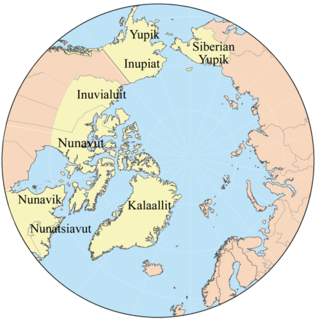
Eskimo or Eskimos are the indigenous circumpolar peoples who have traditionally inhabited the northern circumpolar region from eastern Siberia (Russia) to Alaska, Northern Canada, Nunavik, Nunatsiavut, and Greenland. Inuit, Yupik, Aleut and other individuals consider this term to be a slur.

The Inuit languages are a closely related group of indigenous American languages traditionally spoken across the North American Arctic and to some extent in the subarctic in Labrador. The related Yupik languages are spoken in western and southern Alaska and in the far east of Russia, but are severely endangered in Russia today and spoken only in a few villages on the Chukchi Peninsula. The Inuit live primarily in three countries: Greenland, Canada, and the United States.

Indigenous Canadians are the indigenous peoples within the boundaries of Canada. They comprise the First Nations, Inuit and Métis. Although "Indian" is a term still commonly used in legal documents, the descriptors "Indian" and "Eskimo" have fallen into disuse in Canada, and some consider them to be pejorative. "Aboriginal" as a collective noun is a specific term of art used in some legal documents, including the Constitution Act, 1982, though in some circles that word is also falling into disfavour.

The Iñupiat (or Inupiat, Iñupiaq or Inupiaq; are a group of Alaska Natives, whose traditional territory roughly spans northeast from Norton Sound on the Bering Sea to the northernmost part of the Canada–United States border and often claim to be the first people of the Kauwerak. Their current communities include 34 villages across Iñupiat Nunaŋat including seven Alaskan villages in the North Slope Borough, affiliated with the Arctic Slope Regional Corporation; eleven villages in Northwest Arctic Borough; and sixteen villages affiliated with the Bering Straits Regional Corporation.

The Inuit Circumpolar Council (ICC), formerly Inuit Circumpolar Conference, is a multinational non-governmental organization (NGO) and indigenous peoples' organization (IPO) representing the 180,000 Inuit, Yupik, and Chukchi peoples living in Alaska, Canada, Greenland, and Chukotka (Russia). ICC was ECOSOC-accredited and was granted special consultative status at the UN in 1983.
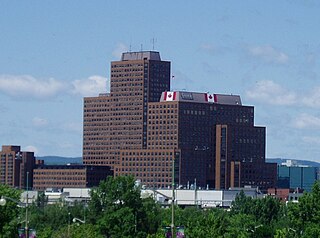
Crown-Indigenous Relations and Northern Affairs Canada is the department of the Government of Canada responsible for Canada's northern lands and territories, and one of two departments with responsibility for policies relating to Indigenous peoples in Canada.

Kalaallit make up the largest group of the Greenlandic Inuit and are concentrated in Kitaa. It is also a contemporary term in the Greenlandic language for the indigenous people living in Greenland. The Kalaallit are a part of the Arctic Inuit. The language spoken by Inuit in Greenland is Kalaallisut, also called Greenlandic.
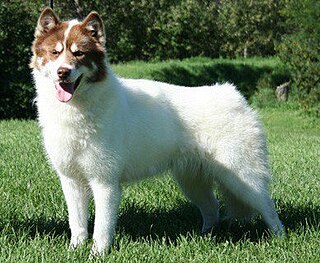
The Canadian Eskimo Dog or Canadian Inuit Dog is a breed of working dog from the Arctic. Other names include qimmiq or qimmit. The Greenland Dog is genetically identical.
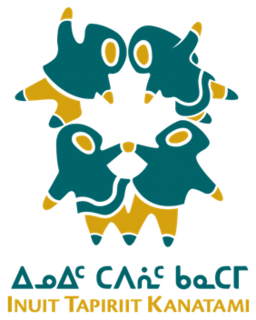
Inuit Tapiriit Kanatami, previously known as the Inuit Tapirisat of Canada, is a nonprofit organization in Canada that represents over 65,000 Inuit. Their mission is to "serve as a national voice protecting and advancing the rights and interests of Inuit in Canada."
The Native American name controversy is an ongoing discussion about the changing terminology used by the indigenous peoples of the Americas to describe themselves, as well as how they prefer to be referred to by others. Preferred terms vary primarily by region and age. As indigenous people and communities are diverse, there is no consensus on naming, aside from the fact that most people prefer to be referred to by their specific nation.
Native Americans may refer to:
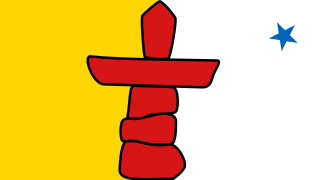
Nunavut is the newest, largest, and northernmost territory of Canada. It was separated officially from the Northwest Territories on April 1, 1999, via the Nunavut Act and the Nunavut Land Claims Agreement Act, which provided this territory to the Inuit people for independent government. The boundaries had been drawn in 1993. The creation of Nunavut resulted in the first major change to Canada's political map since the province of Newfoundland was incorporated in 1949.

The Inughuit, or the Smith Sound Inuit, historically Arctic Highlanders, are Greenlandic Inuit. Formerly known as "Polar Eskimos", they are the northernmost group of Inuit and the northernmost people in North America, living in Greenland. Inughuit make up about 1% of the population of Greenland.
The Inuit Broadcasting Corporation (IBC) is a television production company based in Nunavut. Its programming is targeted at the Inuit population of Nunavut and almost all of its programs are broadcast in Inuktitut. Select programs are also broadcast in English. In contrast with traditional commercial television broadcasting companies, IBC shows centre on Inuit culture. The company has five production centres in various places in Nunavut, all staffed by Inuit. Founded in the early 1980s, the IBC was the first Native language television network in North America.

Inuit are a group of culturally similar indigenous peoples inhabiting the Arctic regions of Greenland, Canada and Alaska. The Inuit languages are part of the Inuit-Yupik-Unangan family. Inuit Sign Language is a critically endangered language isolate used in Nunavut.
Michael Arvaarluk Kusugak is a storyteller and a Canadian children's writer, who tells stories about Arctic and Inuit culture. He was born April 27, 1948 just north of Chesterfield Inlet, at a point of land we call Qatiktalik. That same spring of 1948 he and his family moved to Repulse Bay and in 1960 to Rankin Inlet. In 2019, he lives in Sooke, BC and plans to move to Manitoba in the summer.
The following is an alphabetical list of topics related to Indigenous peoples in Canada, comprising the First Nations, Inuit and Métis peoples.

Greenlanders are people identified with the country of Greenland or the indigenous people, the Greenlandic Inuit. This connection may be residential, legal, historical, or cultural. For most Greenlanders, many of these connections exist and are collectively the source of their being Greenlandic. However, the term can in different contexts be delimited more precisely in different ways: as the inhabitants of Greenland, as nationals of Greenland or more broadly as persons who feel a cultural affiliation in a broad sense to Greenland. More controversial is a more recent use of the word in the sense persons of Greenlandic origin, i.e. persons whose parents were born in Greenland.
The Arctic Council Indigenous Peoples Secretariat (IPS) is a secretariat for the six international indigenous organizations affiliated with the eight-nation Arctic Council. The IPS does not represent indigenous peoples or their organizations, but assists those organizations in presenting their causes, and helps to disseminate information among them. IPS was established in 1994 under the auspices of the Arctic Environmental Protection Strategy (AEPS). It was around the same time that the category of Permanent Participants was being developed and applied to the three indigenous peoples’ organizations then observers in the AEPS. When the Arctic Council was established in 1996, both the Permanent Participants and IPS was reinserted into the new intergovernmental framework. Since commencing business in 1994, the role of the secretariat has been to facilitate contributions from the Permanent Participants to the cooperation of the eight Arctic states and to assist the Permanent Participants in performing, mainly communicational task.
Climate change and Indigenous peoples describes how climate change disproportionately impacts Indigenous peoples around the world when compared to non-Indigenous peoples. These impacts are particularly felt in relation to health, environments, and communities. Some Indigenous scholars of climate change argue that these disproportionately felt impacts are linked to ongoing forms of colonialism. Indigenous peoples found in Africa, the Arctic, Asia, Australia, the Caribbean, Latin America, North America and the Pacific have strategies and traditional knowledge to adapt to climate change. These knowledge systems can be beneficial for their own community's adaptation to climate change as expressions of self-determination as well as to non-Indigenous communities.












